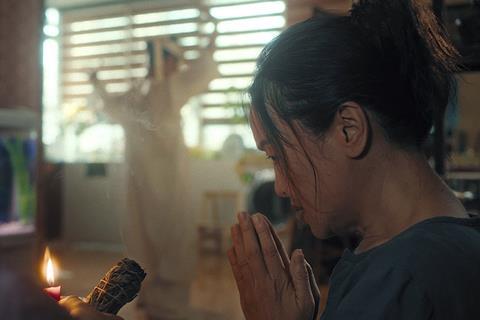A woman turns to the spirits to win back her philandering husband in this enigmatic Vietnamese debu

Dir/scr: Duong Dieu Linh. Vietnam/Singapore/Indonesia/Philippines. 2024. 97mins.
Hardworking Hanoi-based wedding planner Tam (Le Tu Oanh) learns of her husband Thanh’s (Le Vu Long) infidelity in the most humiliating way imaginable – he is caught canoodling with a younger woman on live TV. But rather than confront him, Tam turns to the spiritual arts, consulting a feng shui tattooist and a Buddhist witch doctor to win back her man’s affections. Unfortunately, her husband remains oblivious, but a malign spirit takes a keen interest. The debut film from Duong Dieu Linh, Don’t Cry, Butterfly is an energetically confounding mix of genres – comedy, fantasy and a touch of horror – but may be too culturally specific in its themes and opaque in its messaging to make much of a mark outside of the festival circuit.
An energetically confounding mix of genres
The film premieres in Venice Critics’ Week and will also screen in Toronto. It’s a high-profile launch pad that reflects the anticipation around Linh’s feature debut, which follows a series of well-regarded short films with a shared theme of disappointed middle-aged Vietnamese women (including Adults Don’t Say Sorry, Sweet, Salty and A Trip To Heaven, the latter of which played in competition in Locarno). This feature is a singular proposition but it looks a treat, drenched in saturated colours that vibrate from the screen. The film’s offbeat blend of feminism, folklore and superstition may capture the interest of further festival programmers and domestic audiences.
While the picture’s storytelling can be disjointed and disorientating, the central theme of gender roles and the disconnect between the sexes is the film’s spine. There’s something supernatural lurking in the fabric of the building in which 40-something Tam lives with taciturn, distant Thanh and her 20-year-old daughter Ha (Nguyen Nam Linh). But only the women in the block can see it, its presence manifested at first as a dripping damp spot (like a quirkier version of Hideo Nakata’s Dark Water), and then later as a tar-like substance that extends its sticky tendrils into the room – or perhaps just into Tam’s subconscious. (The film’s use of CGI is visually striking and creative throughout, even if it’s not entirely clear what’s going on for much of the time).
The distance between Tam and her husband is explored through other means. While Tam is constantly on the move, brisk and businesslike as she rattles around her home and her place of work, her husband’s gestures have a heavy, sloth-like sluggishness to them. He barely sees Tam and certainly doesn’t speak to her. Ha, meanwhile, watches her mother’s rejection and desperation with mounting frustration, channelling her energy into guided meditations and dreams of escape to study in Europe. She hopes that her best friend Trong (Bui Thac Phong) will go with her, but abandonment issues consume him – his mother left him to pursue a career as a ballet dancer.
The film is full of errant, dangling threads like Trong’s missing mother and a subplot linked to Tam’s high school reunion, but Linh makes little attempt to tie them all together. There’s also a sense that non-Vietnamese audiences might be missing out on certain key symbolism and references – we learn part of the way through the film that ‘butterfly’ is Vietnamese slang for female genitalia; a key piece of the puzzle, perhaps, given the film’s title.
Production companies: Momo Film Co, Adeline Arts & Science, Fusee, Potato Productions, KawanKawan Media, Pupa Films, Kalei Films
International sales: Barunson E&A, contact@barunsonena.com
Producers: Tan Si En, Wilfredo C. Manalang, Nguyen Mai Ka
Cinematography: Ngo Minh Nghia
Production design: Pham Phong Lan
Editing: Daniel Hui
Music: Diego Ayala Raffalli
Main cast: Le Tu Oanh, Nguyen Nam Linh, Le Vu Long, Bui Thac Phong























